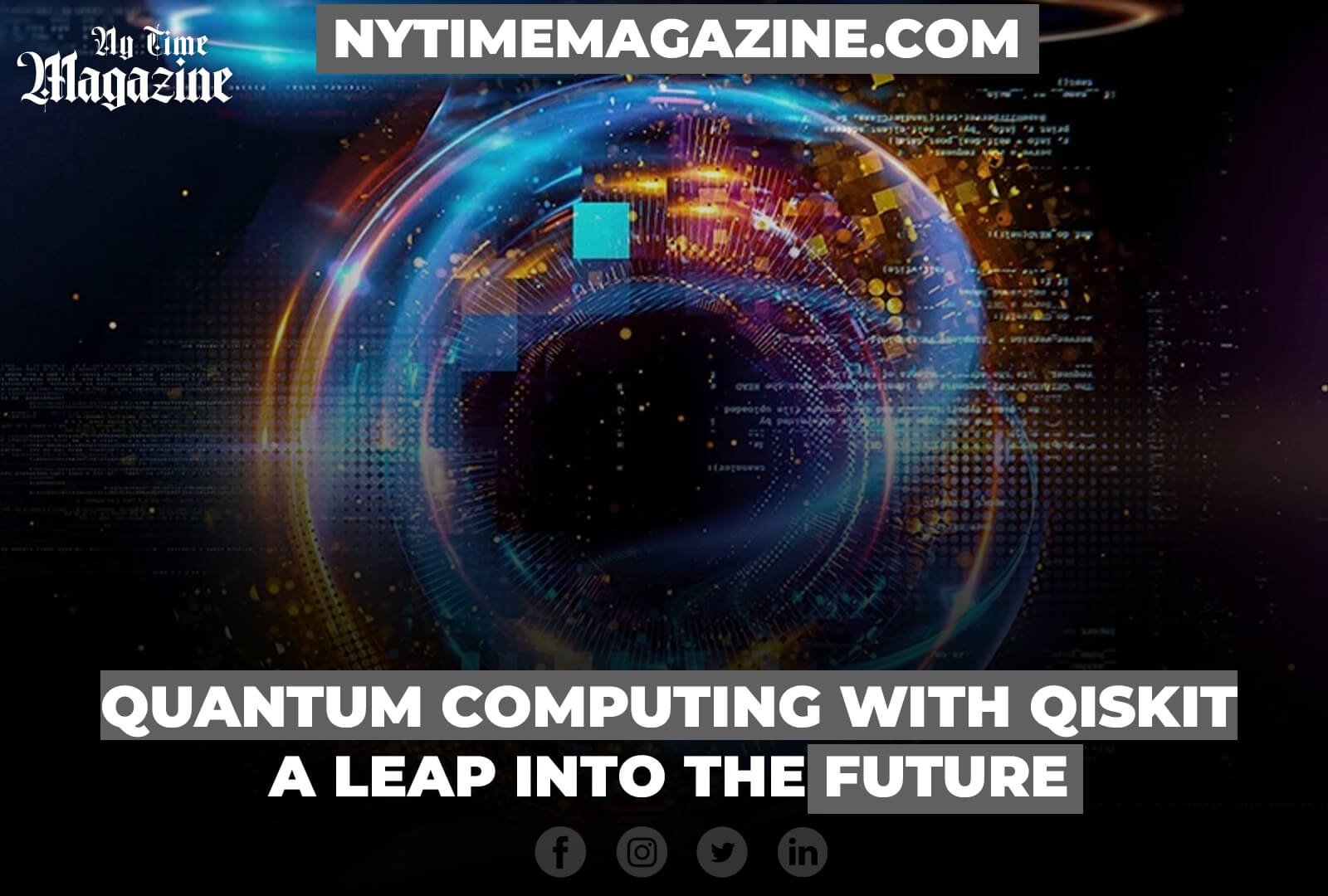The revolutionary field of quantum computing has the potential to completely transform the way we think about computation. Unlike conventional computers, which use bits to process data, quantum computers make use of qubits, leveraging the intriguing and non-intuitive principles of quantum mechanics. This article explores the fundamentals of quantum computing, the tools and technologies advancing its progress, and its wide range of applications, with a particular focus on the role of Qiskit.
Contents
Quantum Bits, or Qubits
At the core of quantum computing lies the essential component known as the qubit. Unlike conventional bits, which can only exist in a state of 0 or 1, qubits possess the remarkable ability to simultaneously represent both 0 and 1. This unique characteristic empowers quantum computers to perform certain calculations up to ten times faster than their classical counterparts.
Entanglement of Quanta
Another crucial aspect of quantum mechanics is entanglement. When qubits are entangled, their states remain interconnected, even when separated by vast distances. This phenomenon holds immense significance for the development of advanced quantum algorithms and secure communication protocols, all of which can be efficiently implemented using Qiskit.
Dimensional Superposition
Superposition and entanglement form the foundation of quantum algorithms. Through superposition, quantum computers can explore multiple potential solutions to a problem simultaneously, providing a significant advantage over classical computers. Qiskit’s versatile features and capabilities further enhance the exploration of superposition in quantum computing.
Tools for Quantum Computing with Qiskit
Infinite Hardware:
a. Leading companies such as IBM, Google, and Rigetti have pioneered the development of quantum processors, often integrated with the Qiskit framework. These systems employ topological qubits, ion traps, or superconducting circuits and operate at extremely low temperatures to carry out quantum computations.
b. Quantum Annealers: Companies like D-Wave Systems produce quantum annealers designed for solving complex optimization problems, with the option to interface with Qiskit for seamless integration.
Atomic Software
a. Qiskit, an open-source quantum computing framework, offers a range of tools for programming quantum computers. It facilitates the creation and testing of quantum algorithms on quantum hardware, making it a vital component of the quantum computing ecosystem.
b. Quantum Simulators: Quantum behavior is simulated on traditional computers using quantum simulators, often integrated with Qiskit. While not as powerful as real quantum processors, they serve as valuable testing grounds for quantum algorithms and circuit designs.
c. Quantum Cloud Services: Several companies provide cloud-based access to quantum hardware, enabling more researchers and developers to use Qiskit and leverage quantum computing resources.
Quantum Computing Use Cases with Qiskit
Encryption and Security:
Quantum computers have the potential to break commonly used encryption algorithms like RSA and ECC. Researchers, in collaboration with Qiskit, are exploring quantum-resistant encryption methods to safeguard data from potential quantum threats. Quantum key distribution (QKD) using Qiskit offers highly secure communication channels.
Medicinal Chemistry and Materials Science:
Quantum computing’s ability to accurately model molecular and material behaviors empowers researchers, particularly those using Qiskit, to develop innovative pharmaceuticals, enhance chemical processes, and create advanced materials across various industries.
Optimizing Issues:
Quantum annealers, combined with Qiskit, excel at solving optimization problems, such as supply chain optimization, portfolio optimization in finance, and route optimization in logistics, where selecting the optimal solution from numerous possibilities is crucial.
Machine Intelligence:
Quantum computing accelerates machine learning algorithms, enhancing pattern recognition, optimization, and data analysis. Quantum machine learning models, developed using Qiskit, are poised to tackle complex challenges more efficiently than their classical counterparts.
Climate Simulation:
The computational demands of climate modeling, required for simulating and assessing complex environmental systems, can be significantly expedited by quantum computers and Qiskit. This contributes to our understanding of climate change and potential mitigation strategies.
Atomic Chemistry:
Chemistry relies heavily on understanding molecular interactions and electronic structures. Problems in quantum chemistry, which are frequently computationally intractable for conventional machines, can be precisely solved by quantum computers, especially when harnessed with Qiskit.
Financial Modeling:
Quantum computing, integrated with Qiskit, enables faster risk analysis, option pricing, and portfolio optimization, potentially revolutionizing financial modeling. This could lead to enhanced financial stability and more informed investment decisions.
Conclusion
In conclusion, quantum computing with Qiskit represents a paradigm shift in computation, addressing challenges that currently lie beyond the capabilities of classical computers. As quantum hardware and software continue to advance, industries spanning climate science, medical discovery, cryptography, and optimization are poised to benefit significantly from this technology. Qiskit is at the forefront of this quantum revolution, shaping the future of technology and science in ways we are only beginning to comprehend.
Frequently Asked Questions
- What Is Quantum Computing, and How Does It Differ from Classical Computing?
- Answer: Quantum computing is a new paradigm of computing that leverages the principles of quantum mechanics. Unlike classical computers that use bits, quantum computers use qubits, which can represent both 0 and 1 simultaneously. This allows for more complex calculations and faster problem-solving in certain cases.
- What Is Qiskit, and How Does It Fit into Quantum Computing?
- Answer: Qiskit is an open-source quantum computing framework developed by IBM. It provides tools and libraries for programming and working with quantum computers. It’s a valuable resource for researchers and developers interested in quantum computing.
- Can You Explain the Concept of Quantum Entanglement?
- Answer: Quantum entanglement is a phenomenon where two or more qubits become correlated in such a way that the state of one qubit is dependent on the state of another, even when they are separated by vast distances. It’s a fundamental aspect of quantum mechanics and has applications in quantum communication.
- What Are Some Real-World Applications of Quantum Computing?
- Answer: Quantum computing has the potential to revolutionize various fields, including cryptography, materials science, optimization, machine learning, and climate modeling. It can help solve complex problems that are currently infeasible for classical computers.
- How Accessible Is Quantum Computing for Researchers and Developers?
- Answer: Quantum computing resources are becoming more accessible. Many companies offer cloud-based access to quantum hardware, and open-source frameworks like Qiskit make it easier for researchers and developers to experiment with quantum algorithms.
- Are There Any Quantum Computing Security Concerns?
- Answer: Yes, quantum computing poses a threat to classical encryption methods. Quantum computers could potentially break widely used encryption algorithms. Researchers are actively working on quantum-resistant encryption techniques to address this concern.
- Can Quantum Computing Solve Environmental Challenges?
- Answer: Yes, quantum computing can significantly accelerate climate simulations and help researchers better understand and address environmental issues. It has the potential to contribute to advancements in climate science and sustainable technologies.
- What Are Some Quantum Computing Use Cases in Healthcare?
- Answer: Quantum computing can aid in drug discovery, molecular modeling, and genomics research. It enables more accurate simulations of complex biological systems, potentially leading to breakthroughs in healthcare and medicine.
- How Does Quantum Computing Impact the Financial Industry?
- Answer: Quantum computing can optimize financial modeling, risk analysis, and portfolio management. It may lead to better-informed investment decisions, improved financial stability, and enhanced risk assessment.
- What Does the Future Hold for Quantum Computing?
- Answer: The future of quantum computing is promising. As hardware and software continue to advance, we can expect quantum computing to play an increasingly significant role in addressing complex global challenges and driving innovation across various industries.



